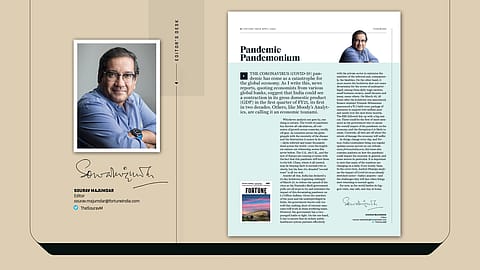From the editor’s desk: Pandemic pandemonium
Editor’s letter from the April 2020 edition of the magazine.

The coronavirus (COVID-19) pandemic has come as a catastrophe for the global economy. As I write this, news reports, quoting economists from various global banks, suggest that India could see a contraction in its gross domestic product (GDP) in the first quarter of FY21, its first in two decades. Others, like Moody’s Analytics, are calling it an economic tsunami.
Whichever analysis one goes by, one thing is certain: The Covid-19 pandemic has thrown all calculations, all estimates of growth across countries, totally off gear. As countries across the globe grapple with the enormity of the disease and the destruction it causes in its wake —lakhs infected and many thousands dead across the world—even the mightiest nations are witnessing scenes like never before. The U.S., the U.K., and the rest of Europe are coming to terms with the fact that this pandemic will test them to the hilt. China, where it all started, may be limping back to normal ever so slowly, but the fear of a dreaded “second wave” is all too real.
Amidst all this, India has declared a 21-day lockdown, beginning midnight of March 25, to reduce the spread of the virus as the Narendra Modi government pulls out all stops to try and minimise the impact of this devastating pandemic on 1.3 billion Indians. Given the numbers of the poor and the underprivileged in India, the government knows only too well that nothing short of extreme measures will work in these terrifying times. However, the government has a twopronged battle to fight. On the one hand, it has to ensure that its rickety public healthcare system partners effectively with the private sector to minimise the numbers of the infected and, consequently, the fatalities. On the other hand, it must ensure the lockdown does not cause devastation for the crores of underprivileged, among them daily wage earners, small business owners, small farmers and many, many others. On March 26, 36 hours after the lockdown was announced, finance minister Nirmala Sitharaman announced a ₹1.7-lakh crore package of measures to support 800 million poor and needy over the next three months. The RBI followed this up with a big rate cut. These could be the first of more measures as the government tries to assess the overall impact of the pandemic on the economy, and the disruption it is likely to cause. Currently, all bets are off about the extent of damage the economy will suffer.
As things change every day, and Fortune India’s journalists bring you regular updates across sectors on our website www.fortuneindia.com, this issue also contains analyses on how the pandemic could impact the economy in general, and some sectors in particular. It is important to note that many of the numbers are changing on a daily, if not hourly, basis. In the cover story, Anshul Dhamija analyses the impact of Covid-19 on an already stretched sector—India’s airports—and the challenges it will face when things start returning to normal again. For now, as the world battles its biggest crisis, stay safe, and stay at home.
This was published in the April 2020 edition of the magazine.